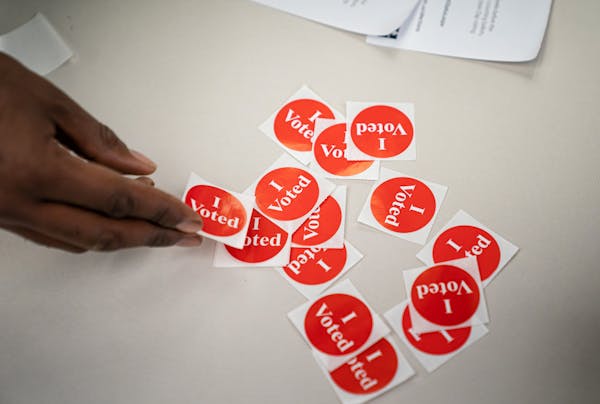The 201 battles to determine political control of Minnesota's House and Senate this fall will feature a host of familiar names.
Incumbents fared well in this week's primary that winnowed the field of Republican and Democratic hopefuls. But so did a handful of GOP newcomers who Democrats say exemplify a far-right shift by some in that party.
"Primary night was a very, very good night for Senate Republicans. All of our incumbents prevailed, and I'm very excited about the political newcomers," Senate Majority Leader Jeremy Miller, R-Winona, said Thursday.
He said voters are concerned about inflation and violent crime, and added: "If Republicans in the Senate are successful, that will be the top two things we tackle right away in the 2023 session."
Republican leaders, who said they believe they will take full control of the currently divided Legislature in November, have zeroed in on those two campaign trail themes, which they see as winning issues for their party.
But some of the GOP winners in Tuesday's races have gone off script.
Republican Nathan Wesenberg, who is running for the Senate in a red district that spreads from Aitkin to Little Falls, defeated two former state representatives in the primary. He said in a post-election statement that he wants to "uproot weak Republicans" and will push for bills declaring that life starts at conception, confirming the right to carry a handgun without a permit and blocking the governor from declaring a peacetime emergency.
Wesenberg was among a small group of Republican primary victors supported by the far-right organization Action 4 Liberty, which aims to take on "the Republican Establishment." The group also celebrated wins by "health freedom candidate" Mark Bishofsky for a Stillwater-area House district, Bill Lieske in a Senate district that includes Northfield and Tom Dippel, who bested GOP state Rep. Tony Jurgens in a Senate battleground district that includes Cottage Grove and Hastings.
Incumbent Rep. Erik Mortensen, another candidate backed by Action 4 Liberty, sailed to victory in his Shakopee district. Last term, Mortensen was kicked out of the New House Republican Caucus, which had splintered from the main GOP caucus a couple years before.
"At what point does it become that this is a group of people that will not be able to govern because of the fringes in their caucus?" said House Speaker Melissa Hortman, DFL-Brooklyn Park.
"My takeaway from the primary was: trouble on the Republican side. I did not have outcomes that made me concerned about our future ability to govern, but I'm very concerned about theirs."
However, Minnesota Republican Party Chair David Hann, a former state legislator, noted the DFL has candidates, such as Minneapolis Senate hopeful Zaynab Mohamed and Sen. Omar Fateh, who are backed by Democratic Socialists of America.
"There's always a range," Hann said of ideologies. "The locals chose candidates that they think are going to represent them the best. ... But we are very confident that overall Republicans will be in the majority in the House and Senate."
In what's widely expected to be a difficult election year for Democrats, DFL leaders said the further-right candidates' primary wins could provide openings to scoop up seats.
Senate Democrats' campaign chair Erin Murphy, DFL-St. Paul, was particularly optimistic about the DFL's chances in the race between Dippel and DFL candidate Judy Seeberger, who is a teacher, paramedic and attorney. "[She] is in a very strong position to win that seat against a MAGA, extremist Republican," Murphy said.
"While the Action 4 Liberty candidates did not prevail in all of those primaries, the ones that have are joining a caucus that has continued to march toward the right and toward extremism," Murphy said.
Action 4 Liberty President Jake Duesenberg said in a statement that he's "quite pleased" with Tuesday's results.
"Establishment Republicans spent tens of thousands of dollars trying to defeat liberty champion Erik Mortensen and health freedom candidate Mark Bishofsky ... The results show that the Republican base is more aligned with us than crony, Kurt Daudt aligned groups like the Jobs Coalition," said Duesenberg, referring to the longtime House GOP leader and a business-aligned PAC that has long bolstered Republicans.
However, many of the more-centrist GOP incumbents held on to their seats, such as Sen. Eric Pratt of Prior Lake, who beat Natalie Barnes, and Sen. Gene Dornink, who defeated Lisa Hanson — the Albert Lea bar owner who went to court for defying the COVID-19 closure mandate.
Pratt, who won the primary despite losing the GOP endorsement in his district, said Thursday that his win likely wasn't about the issues but about connections with voters.
"My team and I worked really hard to talk to voters," Pratt said. "I think most people just know who I am. They know what I stand for."
On the Democratic side, incumbent metro-area Senate Democrats Sandra Pappas and Fateh won contested primaries. Endorsed House candidate Liz Lee beat Rep. John Thompson, who was expelled from the DFL Caucus amid domestic abuse allegations but still ran as a Democrat. And in suburban areas where pairs of incumbent Democrats were forced to face off due to redistricting, Reps. Steve Elkins and Liz Reyer prevailed.
Hortman said that while Democrats have "tough sledding" in a midterm year, they have a few things working in their favor: President Joe Biden is "on a roll" with policy measures; voters are motivated by the fall of Roe v. Wade, and the GOP has embraced some Trump-aligned candidates.
But Daudt, the House minority leader from Crown, remained confident in the Republican roster.
"We successfully defended all of our incumbent members," he said. "And have a phenomenal group of candidates in place who are ready to help Republicans take back the majority this fall."
